Key takeaways
- Gödel’s Incompleteness Theorem reveals that in complex systems, some truths cannot be proven, challenging the notion of absolute knowledge.
- The theorem emphasizes the importance of critical thinking in philosophy, encouraging students to question the foundations of knowledge rather than accepting them uncritically.
- Understanding the theorem fosters intellectual humility, highlighting the limits of human reasoning and the complexity of seeking truth.
- Engaging with Gödel’s ideas promotes resilience in philosophical inquiry, transforming frustration into curiosity and encouraging ongoing exploration of open questions.
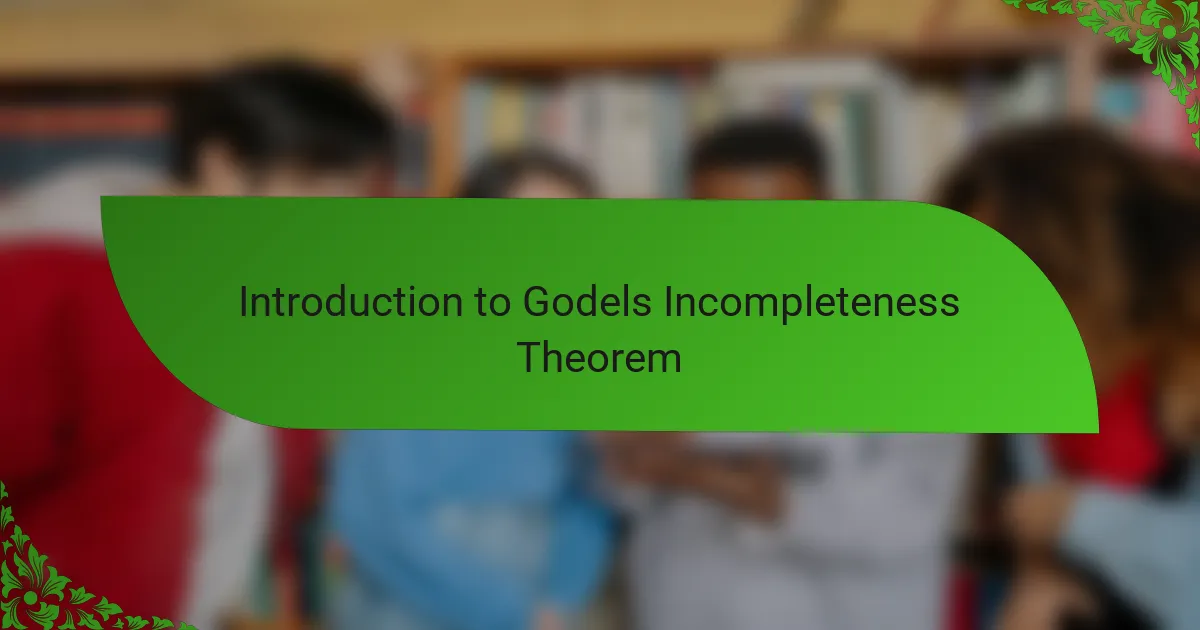
Introduction to Godels Incompleteness Theorem
When I first encountered Gödel’s Incompleteness Theorem, I was struck by how it challenged my assumptions about mathematics and logic. It’s a statement that, in any sufficiently complex system, there will always be truths that cannot be proven within that system. Have you ever felt the frustration of chasing an answer you can’t quite reach? That’s the essence of Gödel’s profound discovery.
This theorem made me rethink the very foundation of knowledge. It suggests that no matter how hard we try, some truths remain just beyond formal proof. It’s like discovering limits where I expected certainty—a humbling revelation that opened my mind to new philosophical questions about truth and understanding.
What fascinated me most was how Gödel’s work bridged math and philosophy in an elegant yet unsettling way. It made me wonder: Can we ever achieve a complete understanding of complex systems, or is incompleteness an inherent part of knowledge itself? This question still shapes how I approach philosophical education today.
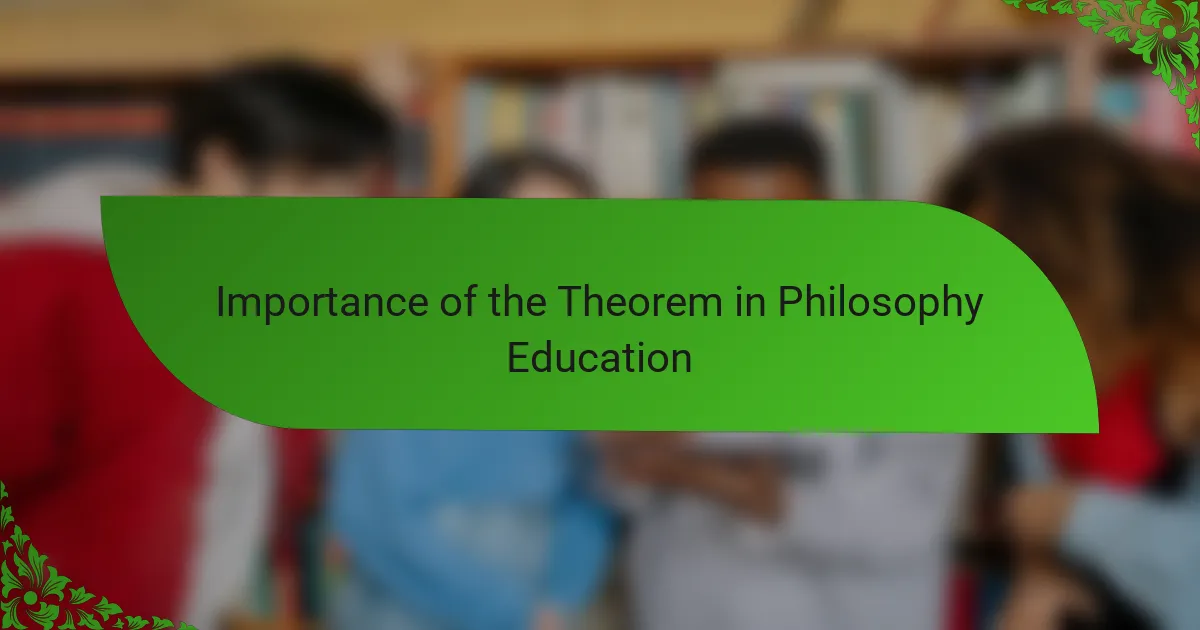
Importance of the Theorem in Philosophy Education
Understanding Gödel’s Incompleteness Theorem reshaped how I view philosophy education because it forces us to confront the limits of human reasoning. It’s not just an abstract math idea—it’s a profound lesson in humility. How often do we assume that every question has a definitive answer? Gödel reminded me that some truths slip through the cracks of formal logic.
This theorem also highlights the necessity of critical thinking in philosophy classes. When I first realized that no system can prove all truths within itself, I saw the value in teaching students to question the foundations of knowledge rather than accepting them blindly. It became clear that grappling with these limits encourages deeper inquiry and intellectual openness.
What excites me most is how discussing Gödel in educational settings sparks vibrant debates about certainty and doubt. It’s a powerful tool to inspire learners to appreciate the complexity of understanding rather than settling for easy answers. In my experience, this openness transforms the way students engage with philosophy long after the lesson ends.
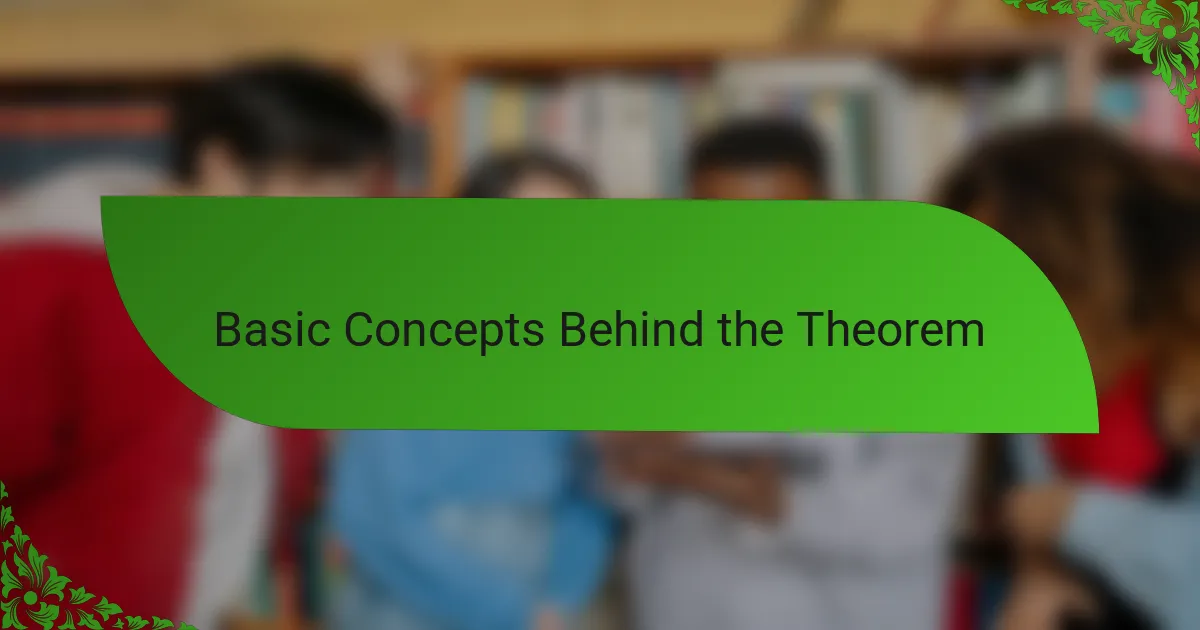
Basic Concepts Behind the Theorem
At its core, Gödel’s Incompleteness Theorem rests on a few key ideas that initially felt abstract to me but soon became surprisingly tangible. One of those is the notion of a “formal system” — think of it as a set of rules and symbols designed to capture truths, much like how language works. I remember grappling with this concept, wondering, “Can such rigid rules really encompass all mathematical truths?”
Then there’s the idea of “consistency,” which means the system never contradicts itself. This seemed straightforward until Gödel showed me that even if a system is consistent, it cannot prove every true statement within its own structure. That blew my mind — it meant that some truths are forever out of reach, no matter how hard we try to prove them internally. How does one accept that limits exist where we once sought certainty?
Lastly, Gödel’s clever use of self-reference — akin to a sentence talking about itself — opened up a whole new way of thinking. It’s like the system is looking in a mirror and describing its own reflection. This self-reflective twist revealed deep flaws in our assumptions about completeness, making me appreciate the subtle complexity lurking beneath seemingly simple logical rules. Have you ever encountered something so simple that it completely changed how you understand everything else? That’s how it felt for me with this part of the theorem.
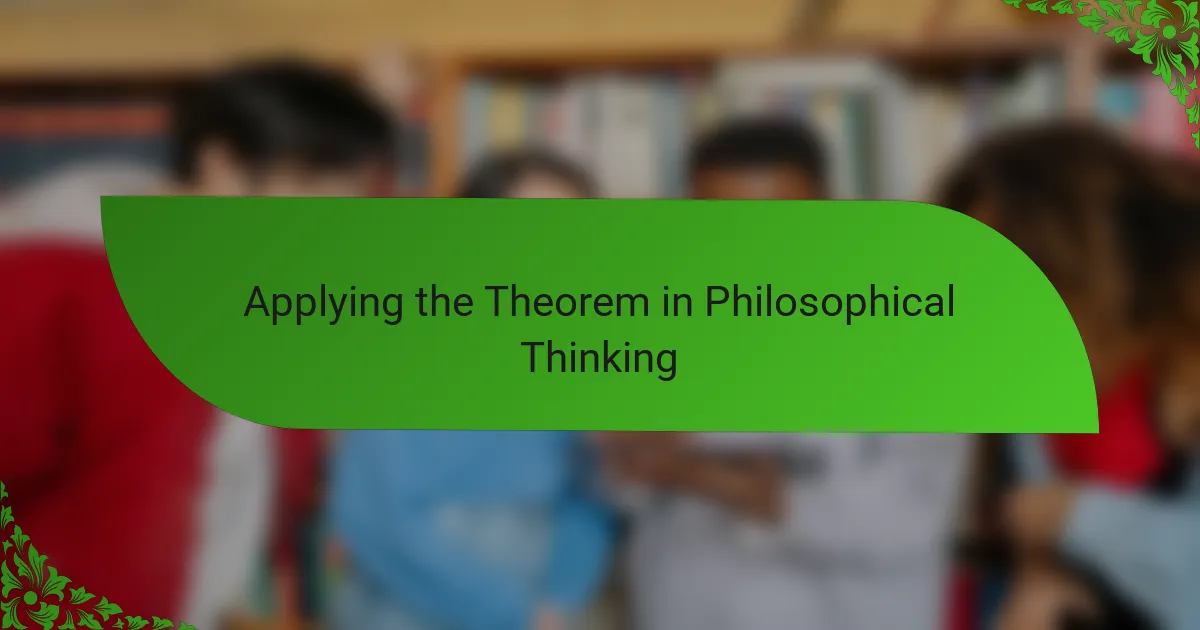
Applying the Theorem in Philosophical Thinking
Applying Gödel’s Incompleteness Theorem in philosophical thinking pushed me to question the very nature of truth. If some truths escape formal proof, how can philosophy claim to capture absolute answers? This realization left me both unsettled and exhilarated—unsettled because certainty felt elusive, but exhilarated because it invited endless exploration.
I found myself reflecting on the limits of human reasoning in a way that felt deeply personal. When I taught this theorem, I noticed students grappling with the discomfort of not having clear-cut answers. Isn’t that what philosophy is really about—embracing doubt and complexity rather than fleeing them? Gödel’s insight gave me a fresh language to discuss this with others.
What intrigues me most is how this theorem fosters intellectual humility. It reminds me that even our best systems, be they logical, ethical, or metaphysical, carry inherent limitations. It’s a humbling yet liberating perspective, one that encourages me to keep questioning without expecting to reach a final truth. Have you ever experienced that shift—from fixating on answers to valuing the questions themselves? That’s the power Gödel brought to my philosophical journey.
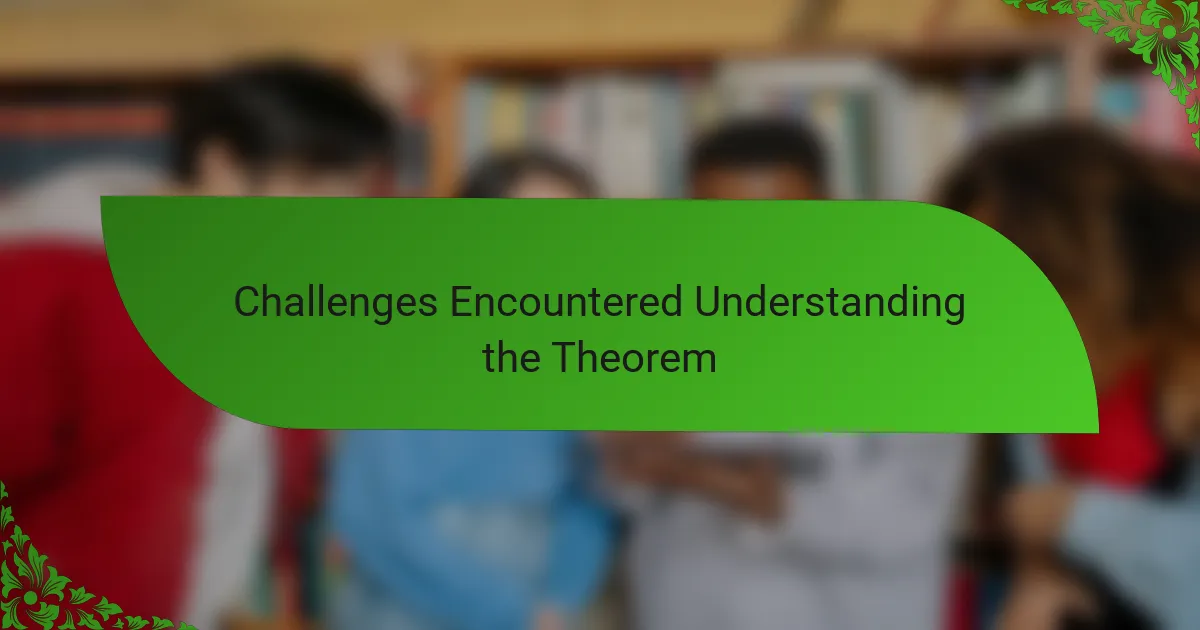
Challenges Encountered Understanding the Theorem
One of the biggest challenges I faced was wrapping my head around the idea that a system could be both consistent and incomplete at the same time. It felt counterintuitive—how can something be reliable yet still miss truths? That paradox kept nagging at me, making me question everything I thought I knew about logic.
Another stumbling block was Gödel’s use of self-reference. At first, it seemed like a clever trick, but then I realized it was the heart of the matter. It reminded me of those mind-bending puzzles where a statement talks about itself, and suddenly nothing is as stable as it seemed. Understanding this was like pulling on a thread that unraveled a much bigger tapestry.
Have you ever tried to explain such a convoluted concept to yourself, only to feel your thoughts spiral into confusion? That’s exactly how I felt in the early days—like chasing a shadow that kept shifting just beyond reach. But slowly, piece by piece, the fog lifted, and I saw the profound beauty in Gödel’s logic, even if it remained elusive.
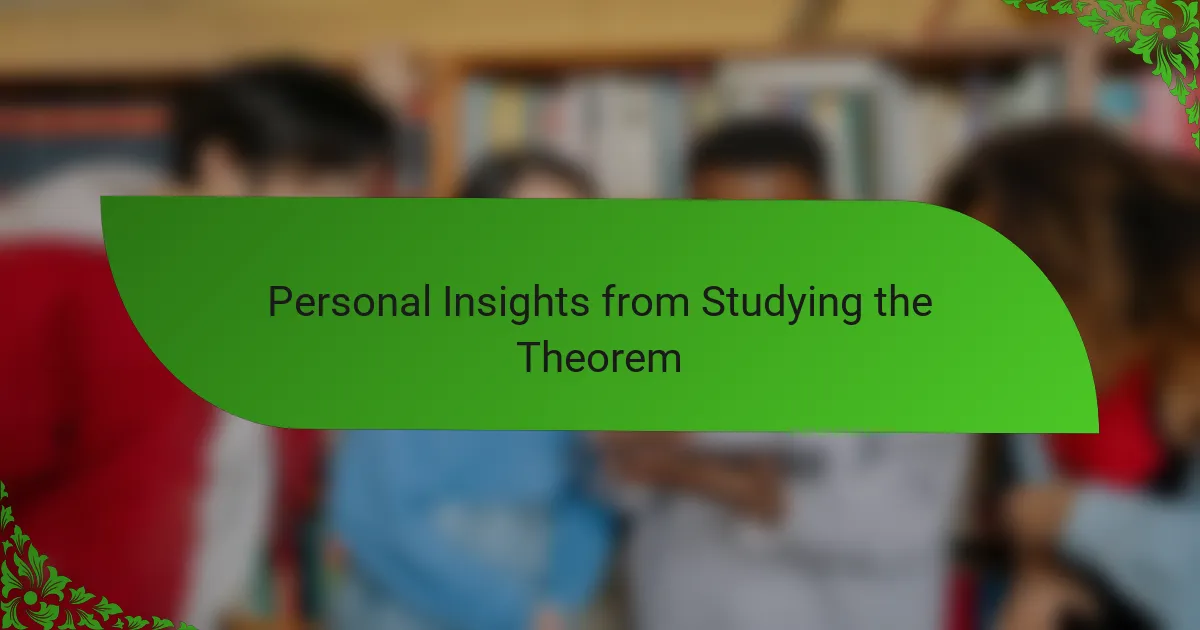
Personal Insights from Studying the Theorem
Studying Gödel’s Incompleteness Theorem felt like standing at the edge of an intellectual abyss. I kept asking myself, “How can something so fundamental reveal limits I never imagined?” That tension between certainty and uncertainty made me realize just how intricate the pursuit of knowledge truly is.
There were moments when the theorem’s implications unsettled me. It’s not every day you confront the idea that no system, no matter how rigorous, can capture every truth inside itself. Yet, this very limitation sparked a sort of awe—like discovering the horizon is vast and endlessly mysterious rather than closed and final.
What I find most rewarding is how this theorem changed my approach to learning and teaching philosophy. Instead of searching for neat answers, I now appreciate the messy, beautiful complexity of grappling with open questions. Isn’t that what real philosophical curiosity is all about?
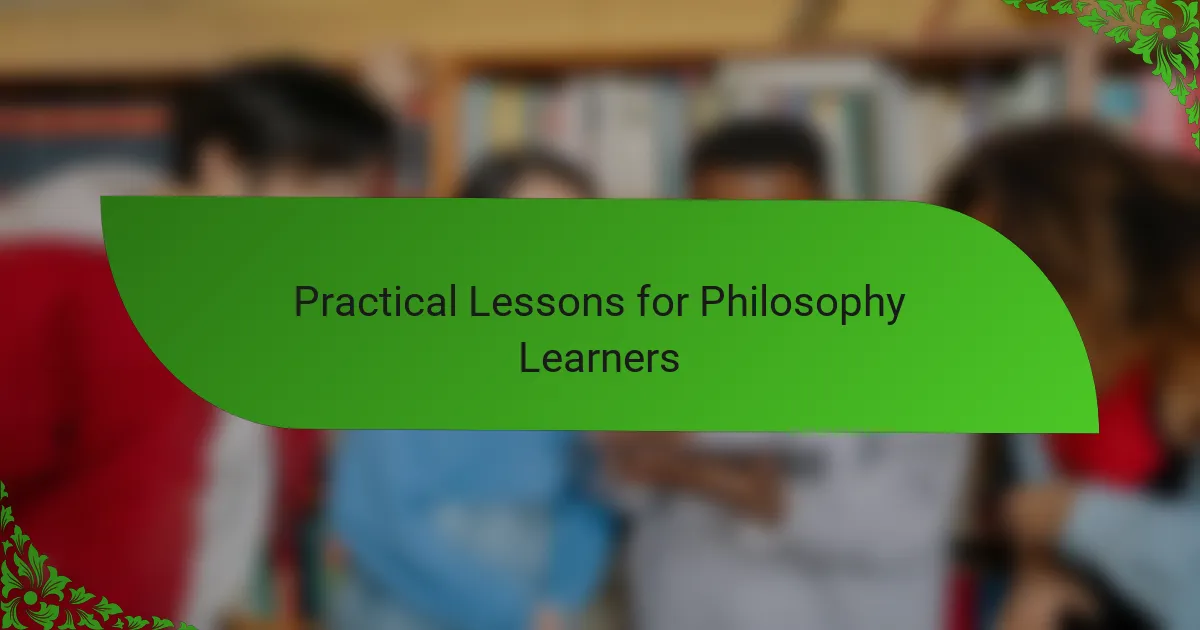
Practical Lessons for Philosophy Learners
One practical lesson I took away from grappling with Gödel’s theorem is learning to embrace uncertainty rather than resist it. Philosophy learners often crave clear answers, but this theorem taught me that accepting the limits of proof can actually deepen our inquiry. Have you noticed how letting go of absolute certainty sometimes sparks your most creative thinking? For me, that openness became a powerful tool.
Another insight concerns humility—even in the most rigorous systems, there are truths that elude capture. This realization reshaped how I see philosophical arguments: instead of seeking airtight conclusions, I now approach ideas as ongoing conversations. It’s like joining a game where the rules keep evolving, inviting us to adapt rather than fixate. Doesn’t that make philosophy feel more alive and less intimidating?
Lastly, discussing Gödel with students revealed how the theorem encourages critical reflection on our assumptions. When learners confront the idea that no system can be fully complete, they start questioning foundational beliefs, which is exactly where philosophical growth begins. In my experience, this challenge fosters resilience—the readiness to face complexity without despair—that every philosophy student desperately needs. Have you felt that shift from frustration to curiosity? That’s where meaningful learning takes root.